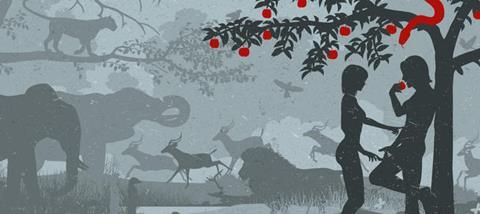'Original sin' is trending on Twitter after educator Katharine Birbalsingh provoked a debate by stating that children have original sin and need to be "habituated into choosing good over evil." But what's the scriptural basis for this controversial doctrine? Our resident Bible scholar David Instone-Brewer investigates

I love the playful rhyming in Tom Lehrer’s Vatican Rag: “Step into that small confessional / There, the guy who’s got religion’ll / Tell you if your sin’s original.”
Catholic priests really have heard it all before because sin is boringly repetitive and unoriginal! But why is that? Is sin in our genes? Have all our sins evolved from an original sin committed by Adam?
Original sin was taught by Augustine (354-430AD) as the guilt that we inherit from our parents. He didn’t just say that we were born with a sinful urge, but that we actually inherit Adam’s guilt, so we are already sinners before we sin. He was also responsible for the risible idea that this sin is transferred during sexual intercourse!
He regarded sex as inherently sinful (perhaps because of his rather misspent youth; a time during which he uttered his famous prayer, “Grant me chastity and continence, but not yet”). Unfortunately, the 5 million born by in vitro fertilisation during the last three decades have proved him wrong in that detail as they sin just like those conceived in the traditional way. So was Augustine also wrong about original sin?
A bad translation
Augustine came up with this doctrine in order to combat a heresy. Pelagius, another theologian, believed that humans could be sinless and pointed out that Jesus had referred to Abel as ‘righteous’ (Matthew 23:35), which implied he had been killed before committing any sin. Augustine countered that even babies who die unbaptised have guilt. To prove this, he quoted Romans 5:12 from his Latin translation of the New Testament: “Sin entered the world through one man, and death through sin, and in this way death came to all people, in whom all sinned” (my italics).
But Augustine’s proof that we all share and inherit Adam’s death was based on a faulty translation of the original Greek. His Latin translation of “in whom” should actually have read “because”. So the correct translation of Romans 5:12 is, “Sin…came to all people, because all sinned.”
The Greek clearly says “because” (Greek houtoos), but what did Paul mean by that? Either he was saying “death came to all people because all [people have themselves] sinned” or “death came to all people, [and] because [death is due to sin] all sinned.”
The doctrine of original sin has perverted our view of God
The second interpretation looks very forced, but this is the only way to make it the basis for the doctrine of original sin. The problem is that nothing else in the Bible says that the guilt for Adam’s sin was passed on to us. The Old Testament didn’t teach this, and nor do the Gospels. So the doctrine of original sin depends solely on one unlikely interpretation of that single verse in Romans.
Animal instincts
Before we glibly discard this doctrine, we had better consider what we would be losing. We may need some concept of original sin in order to explain Jesus’ uniqueness and why he had to die for all. After all, if we are born without any inherited guilt it might be remotely possible for some people to get through life without sinning, which would mean Jesus didn’t need to die for them. (I’d say that isn’t possible!) On the other hand, the advantage of rejecting the doctrine is that we don’t have to worry that innocent babies would go to hell. If people aren’t born guilty, God will judge us for our actual sins and not merely for being born human.
We must not underestimate the seriousness of sin. Sin is refusing to do what God wants. As James 4:17 puts it: “If anyone, then, knows the good they ought to do and doesn’t do it, it is sin for them.” The actions themselves are less important than the fact that we have disobeyed God.
Animals exhibit similar greed, lust, cruelty and deceit. We can see those faults even in our pets. Animal studies have found tribal warfare among chimps, along with the rape, killing and even eating of enemies. Sadly, a recent study of motherhood among dolphins came to an abrupt halt when an aunt stole the baby dolphin and thwarted all attempts to reunite it with its true mother.
These animal instincts became ‘sins’ when God called Adam to a higher lifestyle. He separated Adam in a garden guarded from the rest of the world and gave him the opportunity to be sinless. And even after Adam failed, God still wanted humans to act better than other animals. He gave us laws that we should not mate with whoever happens to be in heat; we should not snatch food or other things that belong to others; we should not kill those who challenge us. So when we do sin, it is a personal affront to God, who has asked us not to follow these animal instincts.
Psalm 51 shows that David realised he had offended God when he slept with Bathsheba then killed her husband. These crimes had victims, but David knew he also needed to ask God to forgive him.
God had treated David as special. He had given him the Holy Spirit to help him resist temptation (Psalm 51:11). David knew that without the Holy Spirit he would follow the evil inclinations he had felt from birth, which he had inherited from his mother (v5). So he asked God to cleanse him again and to create a new heart in him (v7-10).
Conquering sin
In the New Testament, David’s special privilege became normal for all Christians. The Holy Spirit creates a new heart in everyone who repents and Paul said that the Spirit gives Christians the ability to conquer sin (Romans 8:3-6). And yet most of us are gross underachievers in this regard. Perhaps we lack the motivation. We regard ourselves as hopeless sinners, so there seems little point in trying to be different. God is displeased with us anyway, and because his judgement is appeased by his Son, we don’t worry too much.
Perhaps we would respond differently if, instead of God’s judgement, we concentrated on his love for us. We would be more aware of his disappointment when we fail to live up to the wonderful new human nature he has given us in Jesus. Perhaps we would be heartbroken, as God is, when we fell back into our old nature. I’m sure this would make us try harder. Personally, I’m coming to the conclusion that the doctrine of original sin has perverted our view of God, and that removing it will make a huge difference to the way we live.





































